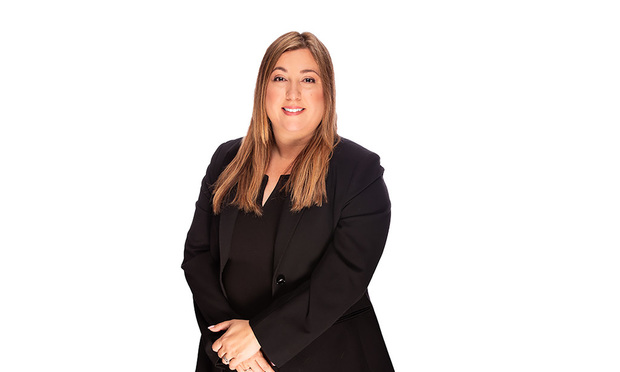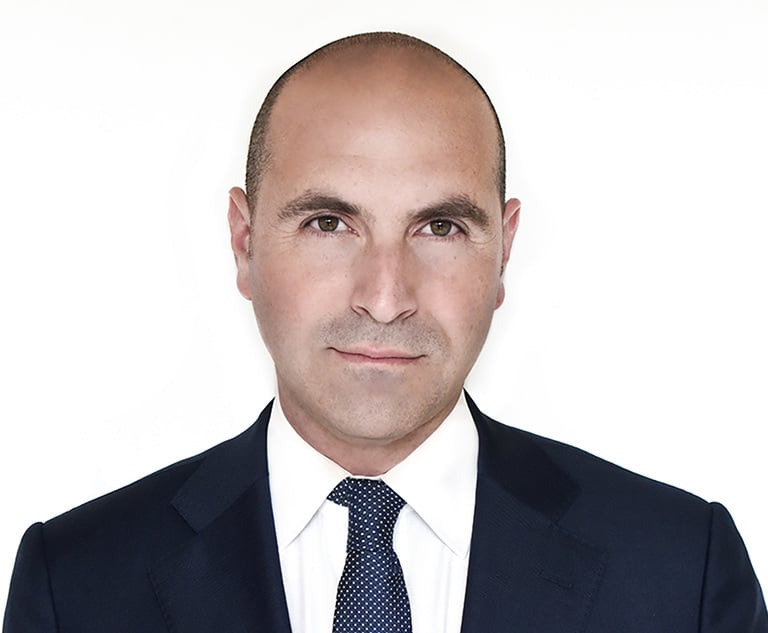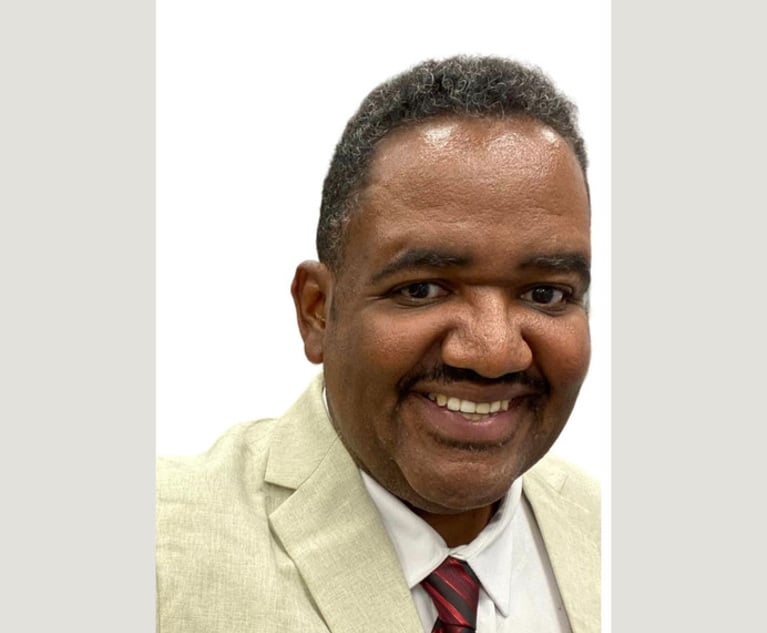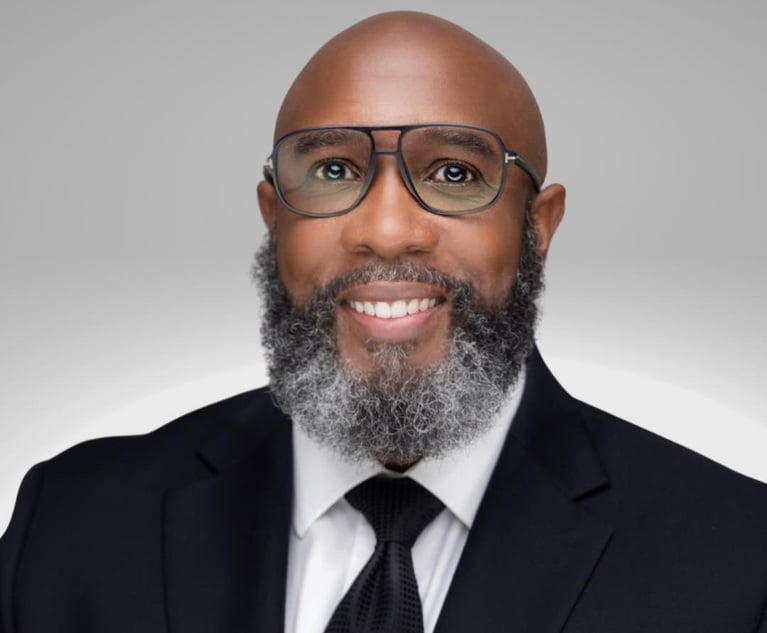How People Watching in a Pizzeria Produced Kluger Kaplan's 1st Hispanic Partner: Christina Echeverri
When Christina I. Echeverri was a child pitching in at her Colombian immigrant father's pizzeria in Hollywood, there was something about his clientele…
December 20, 2019 at 02:27 PM
7 minute read
 Christina Echeverri of Kluger, Kaplan, Silverman, Katzen & Levine in Miami. Courtesy photo.
Christina Echeverri of Kluger, Kaplan, Silverman, Katzen & Levine in Miami. Courtesy photo.
When Christina I. Echeverri was a child pitching in at her Colombian immigrant father's pizzeria in Hollywood, there was something about his clientele that caught her eye. Plenty were well-dressed, self-assured and seemed to ooze success.
"These people are the real thing," her father would point out, "They're making a life for themselves."
They were lawyers.
"I remember saying, 'Oh, this is what I want to do. I want to be just like them,' " Echeverri said.
Echeverri's father was a single parent who, back then, didn't speak any English. He was skilled in air conditioning maintenance and repair, but it hadn't been easy to stay afloat financially.
" I saw him struggle a lot," Echeverri said. "But then I would see these people coming in and they just looked very confident, secure, and it was an image my father always portrayed, that, 'One day, you're going to be a lawyer.' "
That image had staying power.
Now, as Kluger, Kaplan, Silverman, Katzen & Levine's first Hispanic partner, Echeverri specializes in family law, handling divorce, paternity actions, prenuptials, postnuptials and post judgment and enforcement issues.
Echeverri's parents divorced when she was 3, and her father obtained custody. Her mother moved to Arizona, where Echeverri would spend summers, so she has little trouble relating to clients dealing with split households and stepfamilies.
In Echeverri's field, emotion and law can intertwine in a dramatic way, requiring attorneys to bring both case files and a counselor's hat. Every client is fighting an emotional battle and, typically, at least one side is not a willing participant.
" You're not just feeling the financial aspect or the children's issues, but you're dealing with a dissolution of a relationship that could have been three years, 10 years, sometimes 20-plus years, so sometimes these people need an extra bit of help," Echeverri said.
It's also handy, Echeverri says, that she spent her high school and college years managing a customer service call center where she learned how to de-escalate conflict.
Negotiating and litigating well requires understanding a client's deepest personal struggles and even collaborating with their therapists.
"By sometimes having the opportunity to speak to the therapist, which they've given us permission to do on certain cases, we understand the backdrop of their mental issues that are going on during the divorce," Echeverri said. "And it helps us to be able to better settle the case if possible, or deal with them and negotiate for them, based on what they're dealing with emotionally."
When short-term marriages fail, Echeverri says it's often because the parties rushed in "without knowing what they were getting into." The death knell for long-term marriages, in Echeverri's experience, is usually lack of communication.
"A lot of the long-term divorces that we see are as a result of the children leaving the nest, and then the parties have nothing to talk about because they never really communicated during the marriage, other than about their children," Echeverri said. "When they get to be older, sometimes, they don't have that connection anymore."
Crossing borders
Though family lawyers aim to avoid litigation, Kluger Kaplan doesn't shy away from court. And there, Echeverri says South Florida has become a hotbed for complex, cross-border family litigation—where the same parties are litigating in two jurisdictions at the same time.
In one case, Echeverri represented a husband who filed for divorce in Florida, seeking alimony, attorney fees and equitable distribution. But about six months in, his wife filed for alimony in another country, realizing she might receive more there because of the duration of their marriage.
To avoid problems later in the case, Echeverri stressed it's crucial to consult a lawyer in whatever country the litigation bleeds into.
"If you're well-versed in Florida law, it doesn't mean you know what you're doing in another country," Echeverri said.
The Florida case eventually settled, after Echeverri moved to stop the foreign litigation.
Though cross-border litigation isn't a new phenomenon, Echeverri says it's becoming a problem as some parties attempt to get a leg-up or go forum shopping in other jurisdictions. And it's happening everywhere, from South and Central America to Europe, raising questions about how Florida courts should handle judgments, assets and alimony issues belonging to a foreign divorce.
"You can't just have two parallel cases where you're going to have two different decisions, two different awards, potentially, of alimony and two different courts making decisions about the same people," she said.
'I had a different idea'
That said, Echeverri insists the family law arena isn't as cutthroat as people make it out to be.
Jeffrey Rynor of Mitrani, Rynor, Adamsky & Toland in Miami Beach has served as opposing counsel to Echeverri on a handful of cases. In one particularly contentious case, Rynor was struck by her even-keeled personality and by-the-book professionalism.
"When you work on these difficult cases, I think a lawyer's personality comes through," Rynor said. "Her personality allows her to have conversations and discussions which will make everyone involved feel comfortable about the process, even though they oppose her."
Though Echeverri's career began at a civil litigation defense firm, she soon realized the corporate world wasn't her style, preferring to make a difference "in somebody's life, specifically."
Echeverri graduated magna cum laude and served as a judicial intern for now-retired Florida Supreme Court Justice Charles T. Wells, but her greatest attributes are extreme honesty and critical thinking, according to Miami attorney Deborah Chames. She hired Echeverri as an associate before taking her with her to Kluger Kaplan.
"I'm not kidding about this," Chames said. "I've been practicing almost 40 years, and very often when I say, 'Christina, I think this is what we should do,' she'll say, 'You know, Deborah, I had a different idea.' She's not afraid to say it. And her ideas are good," Chames said.
Echeverri also works with Kidside, a charity that supports the Miami-Dade County Courthouse in helping people involved in high-conflict litigation or divorces where children are caught in the crosshairs.
Mother to three children, Echeverri's latest project has seen her work with elementary and middle schools to create new mentoring and learning pathways for children interested in a legal career.
Clients wind up at Echeverri's desk for a host of reasons, depending on "who they found, how they found them and situations they have during their lifetime." And for some, divorce is the best thing that ever happened to them.
Echeverri said there's a cyclical nature to her cases, and that she lives for the satisfaction of achieving closure: "When they [clients] first walk into your office and they're crying to when you're finally settling the case, they're a different person, because they finally have been able to move on."
Christina I. Echeverri
Born: October 1979, Miami
Spouse: Victor Medrano
Children: Layla, Adriana and Anthony Medrano
Education: St. Thomas University, J.D., 2006; Florida International University, B.S., 2002
Experience: Partner, Kluger Kaplan, 2011–present; Associate, Heller & Chames, 2010-2011; Partner, Suarez & Echeverri, 2007-2009; Judicial assistant, Florida Supreme Court Justice Charles T. Wells
More profiles:
Before Jeffrey Epstein's Victims Had a Case, They Had Boies Schiller Veteran Sigrid McCawley
Pillsbury's Michael Kosnitzky Won't Apologize for Representing Billionaires
This content has been archived. It is available through our partners, LexisNexis® and Bloomberg Law.
To view this content, please continue to their sites.
Not a Lexis Subscriber?
Subscribe Now
Not a Bloomberg Law Subscriber?
Subscribe Now
NOT FOR REPRINT
© 2025 ALM Global, LLC, All Rights Reserved. Request academic re-use from www.copyright.com. All other uses, submit a request to [email protected]. For more information visit Asset & Logo Licensing.
You Might Like
View All
Growing Referral Network, Alternative Fees Have This Ex-Big Law’s Atty’s Bankruptcy Practice Soaring
5 minute read
Against the Odds: Voters Elect Woody Clermont to the Broward Judicial Bench
4 minute read
Miami Civil Judge Myriam Lehr to Say Goodbye to the County Court Bench
4 minute readLaw Firms Mentioned
Trending Stories
Who Got The Work
J. Brugh Lower of Gibbons has entered an appearance for industrial equipment supplier Devco Corporation in a pending trademark infringement lawsuit. The suit, accusing the defendant of selling knock-off Graco products, was filed Dec. 18 in New Jersey District Court by Rivkin Radler on behalf of Graco Inc. and Graco Minnesota. The case, assigned to U.S. District Judge Zahid N. Quraishi, is 3:24-cv-11294, Graco Inc. et al v. Devco Corporation.
Who Got The Work
Rebecca Maller-Stein and Kent A. Yalowitz of Arnold & Porter Kaye Scholer have entered their appearances for Hanaco Venture Capital and its executives, Lior Prosor and David Frankel, in a pending securities lawsuit. The action, filed on Dec. 24 in New York Southern District Court by Zell, Aron & Co. on behalf of Goldeneye Advisors, accuses the defendants of negligently and fraudulently managing the plaintiff's $1 million investment. The case, assigned to U.S. District Judge Vernon S. Broderick, is 1:24-cv-09918, Goldeneye Advisors, LLC v. Hanaco Venture Capital, Ltd. et al.
Who Got The Work
Attorneys from A&O Shearman has stepped in as defense counsel for Toronto-Dominion Bank and other defendants in a pending securities class action. The suit, filed Dec. 11 in New York Southern District Court by Bleichmar Fonti & Auld, accuses the defendants of concealing the bank's 'pervasive' deficiencies in regards to its compliance with the Bank Secrecy Act and the quality of its anti-money laundering controls. The case, assigned to U.S. District Judge Arun Subramanian, is 1:24-cv-09445, Gonzalez v. The Toronto-Dominion Bank et al.
Who Got The Work
Crown Castle International, a Pennsylvania company providing shared communications infrastructure, has turned to Luke D. Wolf of Gordon Rees Scully Mansukhani to fend off a pending breach-of-contract lawsuit. The court action, filed Nov. 25 in Michigan Eastern District Court by Hooper Hathaway PC on behalf of The Town Residences LLC, accuses Crown Castle of failing to transfer approximately $30,000 in utility payments from T-Mobile in breach of a roof-top lease and assignment agreement. The case, assigned to U.S. District Judge Susan K. Declercq, is 2:24-cv-13131, The Town Residences LLC v. T-Mobile US, Inc. et al.
Who Got The Work
Wilfred P. Coronato and Daniel M. Schwartz of McCarter & English have stepped in as defense counsel to Electrolux Home Products Inc. in a pending product liability lawsuit. The court action, filed Nov. 26 in New York Eastern District Court by Poulos Lopiccolo PC and Nagel Rice LLP on behalf of David Stern, alleges that the defendant's refrigerators’ drawers and shelving repeatedly break and fall apart within months after purchase. The case, assigned to U.S. District Judge Joan M. Azrack, is 2:24-cv-08204, Stern v. Electrolux Home Products, Inc.
Featured Firms
Law Offices of Gary Martin Hays & Associates, P.C.
(470) 294-1674
Law Offices of Mark E. Salomone
(857) 444-6468
Smith & Hassler
(713) 739-1250







